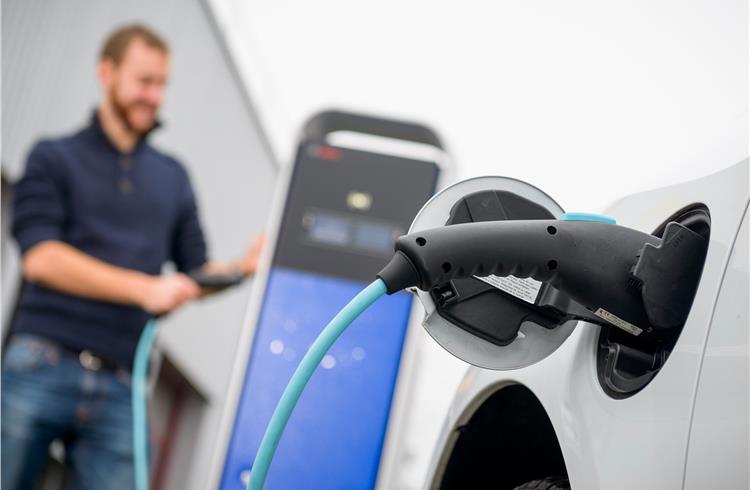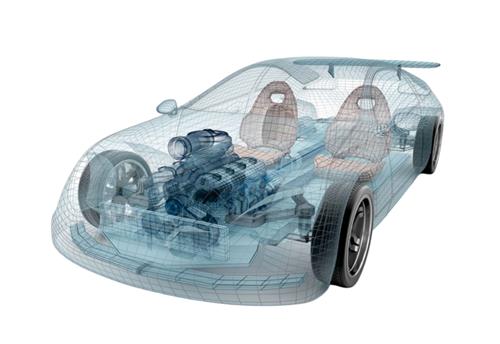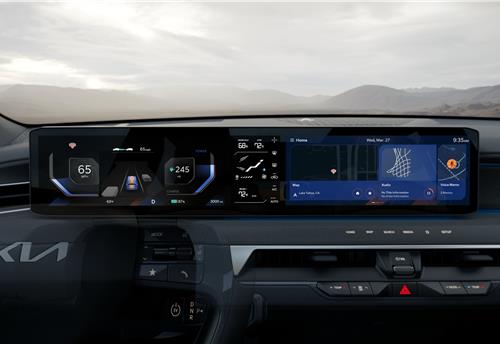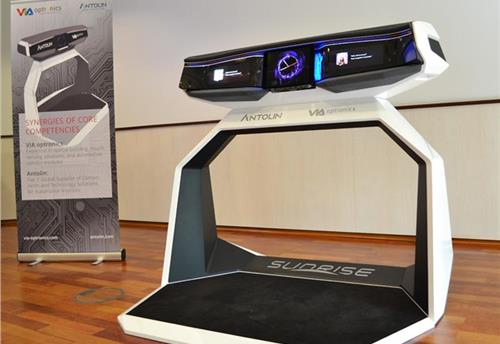Electrification will take combustion engines to new heights: Bosch
15% of new vehicles to have atleast a hybrid powertrain by 2025; clean combustion engines for Euro 6, China 4, and US LEV emissions standards.
The Bosch Group’s largest business sector, Mobility Solutions, continues to grow strongly. After adjusting for exchange-rate effects, the sector’s sales grew 7 percent in the first quarter of 2015. Nominal sales growth was as high as 13 percent1). “Technologically and internationally, our position is so good that we will again grow significantly faster than the market this year,” said Dr. Rolf Bulander, the business sector’s chairman, at the Bosch International Automotive Press Briefing in Boxberg, Germany (May 19 – 21, 2015). In 2014, the business volume of Mobility Solutions grew 8.9 percent, and thus more than twice as fast as global automotive production. Unit sales of important systems such as the ESP anti-skid system, gasoline direct injection systems, and diesel direct injection systems each grew by some 20 percent. In the future, Bosch will also increasingly offer solutions that govern the way cars and other means of transport interact. “We are rethinking personal mobility, and moving toward a multimodal concept encompassing bikes, trains, and buses,” Bulander said, explaining this new goal. “Bosch as a company is looking beyond the hood.”
Electromobility will make diesel and gasoline vehicles even more efficient
On this path to the mobility of the future, Bosch is already achieving success, not just technologically but also commercially. The supplier of technology and services is pursuing three development paths, toward driving that is electric, automated, and connected. “Bosch is making good progress in all three,” Bulander said. In his view, the combustion engine will remain the basis for efficient mobility well into the next decade, even if the powertrain is electrified. Over the next five years, Bosch engine-related technology can reduce the consumption of diesel engines by 10 percent, and that of gasoline engines by nearly 20 percent.
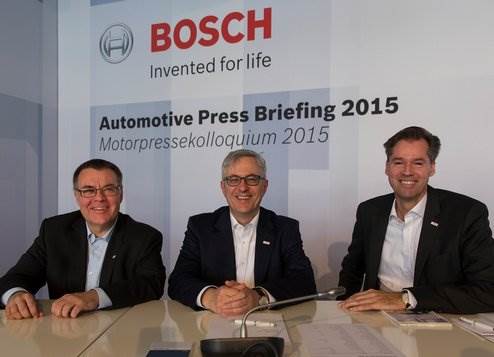
In conjunction with electromobility, the combustion engine will become even more efficient. By 2025, 15 percent of all new vehicles will feature at least a hybrid powertrain. For this combination of electric motor and combustion engine, Bosch’s wide-ranging expertise means it is is excellently equipped. Of the 30 production orders the company has already carried out relating to powertrain electrification, ten alone are plug-in hybrid powertrains for premium vehicles. Over long distances, these vehicles run on diesel or gasoline, but can run in all-electric mode in city driving. “We have the experience it takes to turn an alternative powertrain into a success story,” Bulander said. “It’s what we did with diesel, and it’s what we want to achieve with the electric powertrain, too.”
Automated driving can cut accident figures by up to a third
As the industry moves toward automated driving, the market for driver assistance systems is already expanding. In this market, Bosch is increasing its sales by one-third each year. Last year was the first time that the company sold more than 50 million environment sensors for driver assistance systems. And in 2015, unit sales of radar and video sensors will double, as they did in 2014. Bosch is the global market leader for radar sensors, which are found in systems such as adaptive cruise control. This year, a series of new systems will go into production at the company. These assistance systems help drivers in traffic jams, when taking evasive action, and when parking by remote control. By 2020, the aim is to produce a highway pilot for automated driving on freeways. In the view of the Bosch management board member Dr. Dirk Hoheisel, this is a decisive development step: “With this system, we will make the transition from partly to highly automated driving. Drivers will become passengers. That will mean greater comfort, and above all greater safety.” According to forecasts by Bosch accident researchers, increasing automation can significantly reduce accident figures even further – by up to one-third in Germany alone.
Also read: Bosch beefs up automated driving test fleet with Tesla S Model
Some 2,000 engineers are working on further developing driver assistance systems at Bosch – a good 700 more than two years ago. Following the acquisition of ZF Lenksysteme (now known as Robert Bosch Automotive Steering), the Stuttgart company is in an even better position to take automated driving forward. To quote Bulander: “Bosch technology will enable the cars of the future not only to autonomously accelerate and brake, but also steer.”
Connected driving means a growing service business
The internet will play a pivotal role in the development of the mobility of the future. Even now, it provides real-time traffic news, offering information on things such as accidents and construction zones, or about a traffic jam that starts just around the next bend. Such information is an essential condition for highly automated driving functions. Moreover, drivers can find and reserve vacant charge spots, and pay for the electricity, over the internet. “Connectivity is the key to the success of electrified and automated driving,” said the Bosch management board member Dr. Markus Heyn. In addition, connected driving is leading to new, beneficial services. For example, the transmission of ECU data can serve as the basis for preventive maintenance and tips for fuel saving. Services such as these support the fleet management of leasing and insurance companies. On the Bosch Drivelog mobility portal, drivers can also use such services direct. For this, they need a smartphone app and a connector for reading out the ECU data. All in all, it is expected that some 200,000 vehicles will be web-enabled and thus able to access these Bosch services. To quote Bulander: “Connected driving has left the pilot phase. For Bosch, it is becoming a flourishing service business.”
At the same time, Bosch is connecting diverse forms of transport. In Bulander’s words, these mobility solutions are also intended for multimodal transport: “We are offering new products that go beyond the car, such as services for urban mobility.” One example is the software solution that Bosch has developed for the Stuttgart Services project. Thanks to this software, one chip card is all that is needed for car-sharing, bike-sharing, train and bus travel, as well as for admission to amenities such as swimming pools or libraries. For Bulander, this is a “sneak peek at the transportation services of tomorrow.”
Moreover, Bosch already has prototype developments that connect cars and smart homes. In concrete terms, this means that the navigation system instructs the central heating to warm up the house in good time before the vehicle’s arrival. “Whether for houses or for cars, Bosch creates technology that is ‘Invented for life’,” Bulander said. “With the versatility of our expertise, our prospects for developing new mobility solutions are excellent.”
More on Bosch: Company's auto sector global sales up 13% in Q1
RELATED ARTICLES
Marelli Talbros Chassis Systems wins Rs 1,000 crore business from European OEM
The order, to be executed over an eight-year period, is for the supply suspension arms tailored for both conventional in...
Kia launches customised NBA display themes for North American market
Display Themes is a customised service that supports a personalised vehicle experience, allowing users to customise the ...
Antolin and VIA Optronics unveil versatile vehicle cockpit concept
The Sunrise vehicle concept cockpit, which is engineered for seamless transitions between manual and autonomous driving ...





 By Autocar Pro News Desk
By Autocar Pro News Desk
 20 May 2015
20 May 2015
 3582 Views
3582 Views



